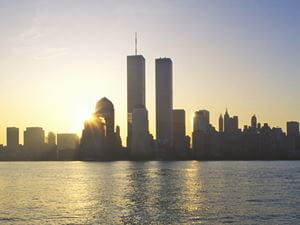
Most of us are familiar with the old proverb about the rock in the river. When we are assailed by the raging waters of life, we are advised to be not a pebble, but a boulder—something which not only resists the river, but changes its very course.
But that proverbial boulder doesn’t always have to represent something positive, like strength or courage or perseverance. Sometimes, it’s vulnerability that changes the stream. September 9th, 2016 marks the 15th anniversary of the terrorist attacks on New York and Washington D.C., attacks which dropped not a boulder, but a mountain into the river of American politics, changing its course forever. And it isn’t going away.
If the Vietnam War began the process of dispelling the notion of an invincible, messianic America established by John Winthrop in 1630, 9/11 finished it. For the first time, a sense of vulnerability permeated the most powerful country on the globe. For the first time, many Americans realized that our country was not universally beloved, not fortified beyond any attack.
What happened to the towers of the World Trade Center, twin symbols of America’s financial prosperity, had unprecedented effects on the U.S. economy, shutting down the stock markets—the first time Wall Street had closed since the Great Depression. It didn’t reopen until September 17th. The Dow fell 7.13 percent, losing 617.78 points in what was its worst one-day drop in history.
America wept. It prayed, it wailed, and its people unified like never before. And, together, they swore revenge.
War came. On September 20th, President Bush called for the beginning of the War on Terror, telling Americans that they “should not expect one battle, but a lengthy campaign, unlike any other we have ever seen.”
How true that was.
We’ve been embroiled in the War on Terror for 16 years now, at the cost of nearly 2 trillion dollars and over 6 thousand American lives, as well as around 1.3 million lives globally.
But the costs, as steep as they’ve been, don’t end there.
In literature, there are certain experiences that nearly every protagonist goes through in order for a compelling story to be told. One of them involves the choice of how to respond to hardship. When the antagonists press in, when they begin to play unfair, and show themselves to be more powerful than expected, the protagonist has a choice—play dirty, compromising all they stand for, or rise above, and risk the loss of something they love. Neither choice is necessarily the better one, and each has its own consequences. It’s a hard choice that makes for great reading. In reality, however, it’s an agonizing process to undergo.
America experienced that very moment a little after 9/11. With clouds of smoke and ash still drifting in the air, we chose vengeance. We chose to call the terrorist attacks in New York and Washington D.C. acts of war rather than the actions of criminals. And that choice became the rock in the river of America.
Within two years of the attacks, there came the Department of Homeland Security, the TSA, and the Patriot Act. There came anti-Muslim demonstrations and the demonization of Middle-eastern culture. Deportations hit a record high or nearly 400,000 annually. Flying the friendly skies was no longer so friendly, and became known for long lines, body scans, pat-downs, and restrictive policies.
Government intrusion increased to unprecedented levels in the years after. Classified documents exposed by Edward Snowden in 2013 showed just how much privacy American citizens had lost since 9/11, revealing phone, email, and video surveillance programs focused both on citizens and foreign governments—including our closest allies. This may seem reasonable in a world where a handful of men can kill thousands, but this surveillance, arguably, has gone too far. The NSA, in an extreme example, was revealed to be tracking the sexual habits of people they deemed “radicalizers,” in order to discredit them. This unmitigated gathering of information and its subsequently questionable use caused many Americans to greatly distrust the American government.
That distrust wasn’t limited to the authorities. 9/11 also marked the beginning of a virulent xenophobia that swept through America, the echoes of which can still be heard today. The Muslim world was enduringly conflated with terrorism. Terms like “towel-heads” became common as the dehumanizing aspect of war took its toll on the American psyche. Islamophobic attacks increased by nearly 1,700 percent in 2001, going from 28 before 9/11, to 481 after the attacks. In the decade or so after the opening of the War on Terrorism, America was not at her best.
But even the most massive boulder is worn to nothing by persistent waters, and America has much to learn from what is one of its most traumatic experiences.
Respecting human rights should always be fundamental. No matter the conflict, no matter the scale, no people group should ever be wholly dehumanized. As we’ve seen in the stories coming from domestic Muslim communities, tales of oppression and violence and grief, we’ve found that they, too, are human. They are more like us than unlike us. Dividing the world into “us” and “them” is never helpful. We are all “us”. We would do well to remember that.
And after Snowden’s 2013 revelations, the outcry to end invasive spying programs established after 9/11 has reached an all-time high. If we wish to balance safety and freedom, we must learn to live with a sense of vulnerability, to live with the knowledge that we there will always be danger, but that it is not worth donning the yoke of the absence of privacy.
Perhaps most importantly, we must learn that a more thoughtful, measured approach to war should be taken. War is, at times, necessary. To deny that would be naive. But rather than acting out of a sense of vengeance, we must act out of a sense of justice, carefully planning our approach from a place of emotion, but from one of reason.
As you think on the tragic events of the 9/11 terrorist attacks, consider what you’ve learned in the subsequent years. Think critically. What you learn, and how you relate that to those around you, will mark the rest of history. We’re still, even 15 years later, at a turning point in American politics and culture, and the choice of how we continue to grow and react remains ours.
How will history remember post-9/11 America? You decide.

